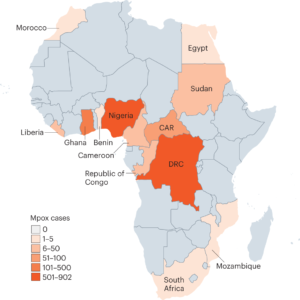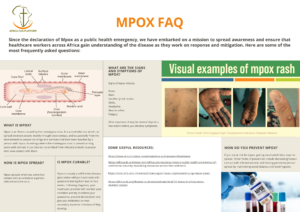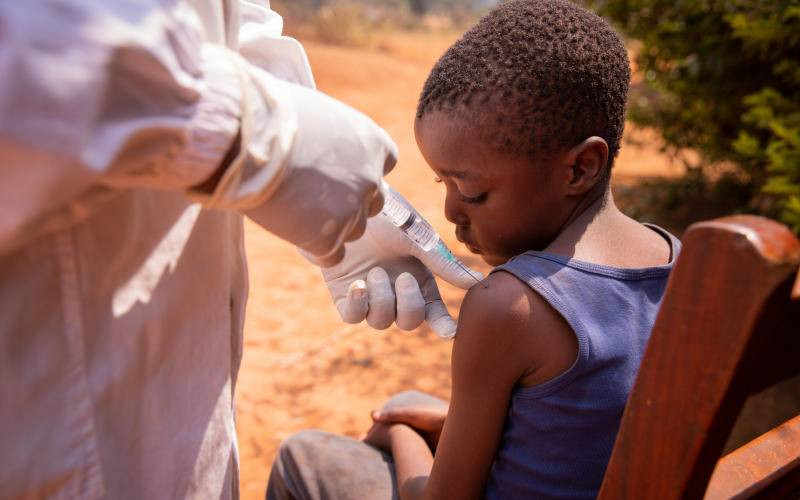Mpox declared a public health emergency.
 On 13th August 2024, Africa CDC officially declared the ongoing Mpox outbreak a Public Health Emergency of Continental Security. At least 12 African countries have reported Mpox outbreaks, and have so far confirmed 2,863 cases and 517 deaths, primarily in the Democratic Republic of the Congo (DRC). So far this year, more than 2100 laboratory-confirmed cases and 13 deaths have been reported from 12 countries (Burundi, Cameroon, Central African Republic, Congo, Cote d’Ivoire, the Democratic Republic of the Congo, Kenya, Liberia, Nigeria, Rwanda, South Africa and Uganda) compared with 1145 confirmed cases and seven deaths in the whole of 2023 reported from 11 countries (WHO AFRO, 15th August 2024)i. The rapid spread is partly related to emergence of a new strain of the virus and displacement of populations due to conflict in Eastern DRC.
On 13th August 2024, Africa CDC officially declared the ongoing Mpox outbreak a Public Health Emergency of Continental Security. At least 12 African countries have reported Mpox outbreaks, and have so far confirmed 2,863 cases and 517 deaths, primarily in the Democratic Republic of the Congo (DRC). So far this year, more than 2100 laboratory-confirmed cases and 13 deaths have been reported from 12 countries (Burundi, Cameroon, Central African Republic, Congo, Cote d’Ivoire, the Democratic Republic of the Congo, Kenya, Liberia, Nigeria, Rwanda, South Africa and Uganda) compared with 1145 confirmed cases and seven deaths in the whole of 2023 reported from 11 countries (WHO AFRO, 15th August 2024)i. The rapid spread is partly related to emergence of a new strain of the virus and displacement of populations due to conflict in Eastern DRC.
WHAT WE KNOW ABOUT MPOX
Mpox (monkeypox) is a viral illness caused by the monkeypox virus, a species of the genus Orthopoxvirus. Common symptoms of mpox are a skin rash or mucosal lesions which can last 2–4 weeks accompanied by fever, headache, muscle aches, back pain, low energy, and swollen lymph nodes.
Mpox can be transmitted to humans through physical contact with someone who is infectious, with contaminated materials, or with infected animals.
Laboratory confirmation of mpox is done by testing skin lesion material by PCR.
Mpox is treated with supportive care. Vaccines and therapeutics developed for smallpox and approved for use in some countries can be used for mpox in some circumstances.
Mpox can be prevented by avoiding physical contact with someone who has mpox. Vaccination can help prevent infection for people at risk of exposure in an outbreak. Currently, WHO recommends two vaccines: MVA-BN and LC-16, that are in limited stock and should be prioritized for at risk populations
Source:https://www.who.int/news-room/fact-sheets/detail/monkeypox

Recommended control measures include:
Emergency Coordination between government and stakeholders for public health response appropriate for the local context and integrated with key health services
Collaborative surveillance
Community protection: raising awareness and empowering communities to adopt protective measures
Provision of safe and stigma free clinical care
Counter measures: Improving access to effective diagnostics, vaccines and therapeutics.
Research for better understanding of modes of transmission; age-specific cases (incidence), deaths and seroprevalence; and characterization of risk factors for MPXV infection and severity of disease.
As an umbrella organization that brings together national Christian health associations across the continent, ACHAP is uniquely positioned to mobilize resources, build capacity, and support communities during public health emergencies. The Mpox crisis has highlighted ACHAP’s critical role in strengthening healthcare systems, particularly in underserved and rural areas where faith-based organizations (FBOs) often provide essential healthcare services.
ACHAP’S IMMEDIATE RESPONSE STRATEGIES
Resource Mobilization.
ACHAP will leverage its extensive network of CHAs, donors, and international partners to secure technical and financial needed to address the outbreak. We have played a key role in coordinating the distribution of vaccines and personal protective equipment (PPE) to healthcare workers in regions heavily affected by disease outbreaks, ensuring that even the most vulnerable populations have access to preventive measures.
Capacity Building for Emergency Response.
Recognizing the importance of a well-prepared healthcare workforce, ACHAP is organizing communication and training webinars for our members on the front lines of the Mpox outbreak. These sessions will focus on establishment of in-country rapid response and coordination teams, equipped with the skills and knowledge to respond quickly to emerging cases, conduct contact tracing, and implement containment measures. By building the capacity of these teams, ACHAP ensures that its member associations are not only able to respond to the current Mpox outbreak but are also better prepared for future public health emergencies.
Community engagement and education.
In collaboration with our members, we are working to empower local communities with the knowledge and resources needed to prevent Mpox transmission, recognize symptoms early, and seek appropriate medical care. This community-based approach is vital in areas where healthcare access is limited, and traditional healthcare systems may be overwhelmed by the outbreak.
Collaboration and Advocacy.
ACHAP will work closely with national governments, regional bodies like the Africa Centres for Disease Control and Prevention (Africa CDC), and international partners to ensure that the voices of faith-based healthcare providers are heard in the broader public health response. ACHAP’s advocacy efforts are also focused on ensuring that the needs of marginalized and vulnerable populations are addressed in the response to Mpox. By advocating for equitable access to healthcare services and resources, we shall help to to ensure that no community is left behind in the fight against this disease.
The scale of this public health emergency demands our collective action, leveraging our combined strengths, resources, and networks to safeguard our communities. We encourage our members and partners to unite in concerted efforts to enhance surveillance, expand vaccination coverage, and provide critical healthcare services, particularly in underserved areas where the need is greatest. Let us stand together in this vital mission to protect and heal our communities.
Two are better than one, because they have a good return for their labour- Ecclesiastes 4:9
CONTACT PERSON
Dr. Alex Muhereza- Senior Technical Advisor, Health Programmes
Email:amuhereza@africachap.org

